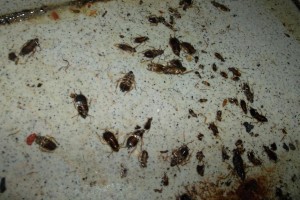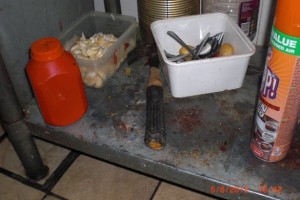Over 16 years after the Dirty Dining series of articles appeared in the Toronto Star, which led to the creation of the red-yellow-green restaurant inspection disclosure system, and the arguments haven’t changed: people want the information, good restaurants promote their good food safety scores, and the various lobbies think the system is silly.
 On Jan. 8, 2001, Toronto’s DineSafe program was launched.s
On Jan. 8, 2001, Toronto’s DineSafe program was launched.s
But before the bylaw came into effect, the Ontario Restaurant Hotel and Motel Association sought an injunction to prohibit the requirement to post the rating signs. I was retained to write a report on the merits and flaws of restaurant inspection disclosure and in particular the use of red-yellow-green. I wrote my report, it was submitted. The restaurant thingies lost the case and lost an appeal. I didn’t get to testify, and was disappointed that I had lost the opportunity to be in a courtroom where I wasn’t charged with something.
CBC Television’s Marketplace has decided to revisit the issue.
Canadians love to dine out, but information about how restaurants fare in health inspection reports is not always easy to find, a CBC Marketplace investigation reveals.
Canadian households spend an average of about $2,000 every year eating in restaurants, and almost two million of us contract foodborne illnesses while eating out, according to Health Canada.
The difficulty for restaurant patrons is that Canada has a patchwork of rules and regulations around how inspection reports are made public.
Some Canadian provinces or cities publish inspection results, but they’re not posted in restaurants where people can see them before ordering a meal. Others, such as Manitoba, do not publish reports, although after a Marketplace investigation the province agreed to make some available to the CBC.
 Toronto launched a public restaurant grading system more than a decade ago that posts the results where customers can see them, a move the city says contributed to a dramatic jump in compliance levels and a significant drop in foodborne illness. But an industry group has opposed attempts to introduce similar systems elsewhere, and few jurisdictions have adopted the city’s approach.
Toronto launched a public restaurant grading system more than a decade ago that posts the results where customers can see them, a move the city says contributed to a dramatic jump in compliance levels and a significant drop in foodborne illness. But an industry group has opposed attempts to introduce similar systems elsewhere, and few jurisdictions have adopted the city’s approach.
“Food safety is a very serious matter,” says Jim Chan, a retired public health inspector who spent 36 years with Toronto Public Health. “Anything that can affect my decision not to expose myself to a health hazard, any Canadian in the country should have the right to that information. As a citizen I should have that information to be able to make an informed decision.”
CBC Marketplace analyzed the data from almost 5,000 public health restaurant inspections in five Canadian cities — Vancouver, Calgary, Regina, Toronto and Ottawa — from a one year period.
Marketplace’s investigation, Canada’s Restaurant Secrets, ranks 13 chains based on their inspection records, including coffee shops, fast food restaurants and family dining establishments. The episode airs on Friday at 8:00 p.m. (8:30 p.m. in Newfoundland and Labrador) on CBC TV.
About half of foodborne illness in Canada happen from eating in restaurants, according to Health Canada.
A 2012 report by the Conference Board of Canada on improving food safety in Canada found that while restaurants are a major source of foodborne illness, inspections by themselves don’t go far enough to protect Canadians from getting sick.
“The restaurant inspection system is helpful; enforcement should be continued. But it is too sporadic, due to limited resources for inspections, to have a decisive impact on restaurants’ actual day-to-day food safety practices,” the report states.
While the report concludes that restaurants need to voluntarily adopt good practices, the group acknowledges that consumers need to be more aware of risks.
“Because half or more of food safety incidents are associated with restaurants and other food service establishments, consumer choices about where to eat can play a role in determining the level of risk to which they are exposed.”
In some cases, foodborne illness outbreaks traced back to restaurants have sickened dozens of people. In one 2008 case, an outbreak at a Harvey’s and Swiss Chalet restaurant in North Bay sickened more than 200 people, many with confirmed cases of E.coli.
“You have no choice but to trust the people who have prepared this for you,” one person who got sick in the outbreak told Marketplace. “Like, everything can look fantastic, but a couple days later you might [experience] a couple of very alarming symptoms.”
In another case in 2011, seven people were hospitalized after eating tuna at a Subway restaurant in the Vancouver airport.
The Toronto DineSafe program requires restaurants to visibly post the results of their latest inspection, which are easy for the public to understand (the colour coded grades are green for “pass,” yellow for “conditional pass” and red for “closed”).
“It’s very transparent,” Chan says. “The operator can actually see what the customer’s seeing, so if you don’t want customer to see something bad written on the report, make sure you correct it before the health inspector walks in.
“It’s good news for food safety,” he adds.
Since DineSafe launched in 2001, Toronto has seen a 30 per cent decline in the number of cases of foodborne illness, according to Toronto Public Health figures.
“It is not possible to conclude definitively that the increased public attention paid to food safety and the program enhancements implemented by TPH during this period were responsible for the reduction in cases,” a city report cautions, “but it is reasonable to suggest that these changes played a role.”
Toronto’s program has also become a model for programs around the world, from Sacramento to Shanghai. In 2011, DineSafe won the prestigious Samuel J. Crumbine Consumer Protection Award for excellence in food protection. Toronto is the only city outside of the U.S. to be awarded the prize.
According to Toronto Public Health, compliance rates have jumped dramatically since the program was implemented in 2001. When the program began, only 78.2 per cent of restaurants passed inspections; by the end of 2012, that number increased to 92.4 per cent.
Yet despite these successes, the restaurant industry continues to oppose public posting of inspection results.
Restaurants Canada, a group that advocates and lobbies for the industry, actively opposes broader implementation of grading programs like Toronto’s in other Canadian cities.
While regions near Toronto, including Peel, Halton, Hamilton and London, have also adopted publicly posted grading systems, diners elsewhere face a patchwork of public health reporting systems.
Some jurisdictions post inspection results online, but it’s up to consumers to look restaurants up individually and try to understand the results. Other places, such as Montreal, do not make inspection reports public.
When Montreal abandoned a plan to implement a similar system last year, Restaurants Canada — formerly called the Canadian Restaurant and Foodservices Association (CRFA) — declared it “A win for members!” on its website.
The group refused to discuss on camera why it opposes public grading systems. In a statement, spokesperson Prasanthi Vasanthakumar wrote: “CRFA is opposed to the use of a ‘grade’ or ‘score’ to inform the public about the safety and hygiene of a restaurant because complex inspection findings based on subjective interpretations by individual inspectors cannot accurately or fairly be reduced to a single grade.”
That’s right: the group representing restaurants argues the people who spend money to have a meal are too dumb to know the complexities or restaurant inspection.
I don’t eat out much: must be too dumb.
 ABC Action News I-Team uncovered that last week, Subway at 696 S. Gulfview Blvd. in Clearwater Beach had to temporarily close after the state discovered over 40 rodent droppings underneath the storage rack, on top of boxes, underneath the sink, inside a bin, and near the soda syrup dispensers.
ABC Action News I-Team uncovered that last week, Subway at 696 S. Gulfview Blvd. in Clearwater Beach had to temporarily close after the state discovered over 40 rodent droppings underneath the storage rack, on top of boxes, underneath the sink, inside a bin, and near the soda syrup dispensers.










